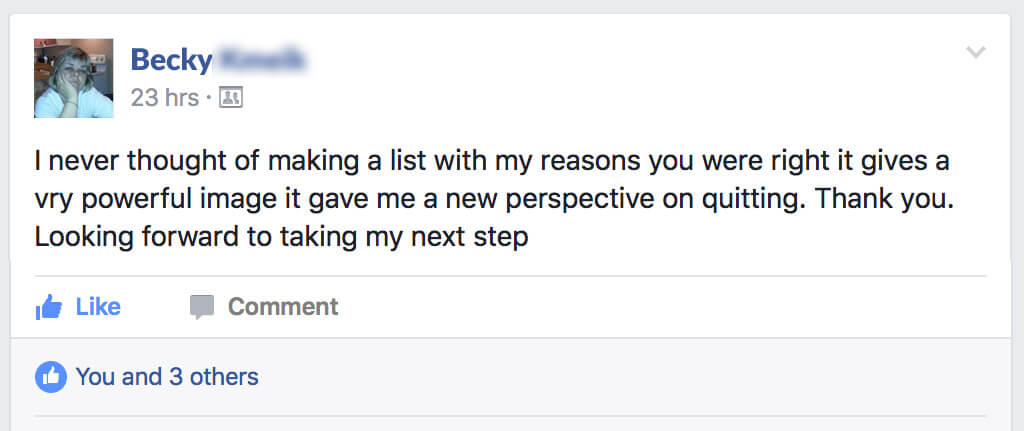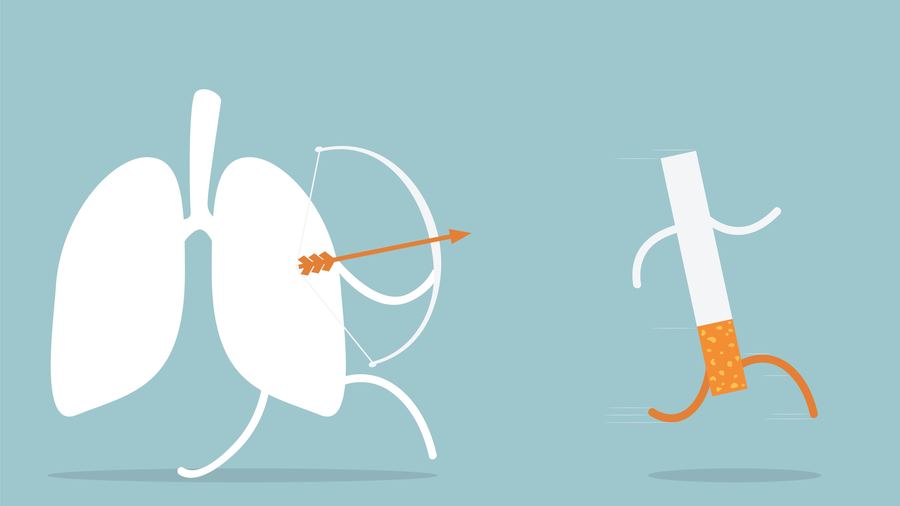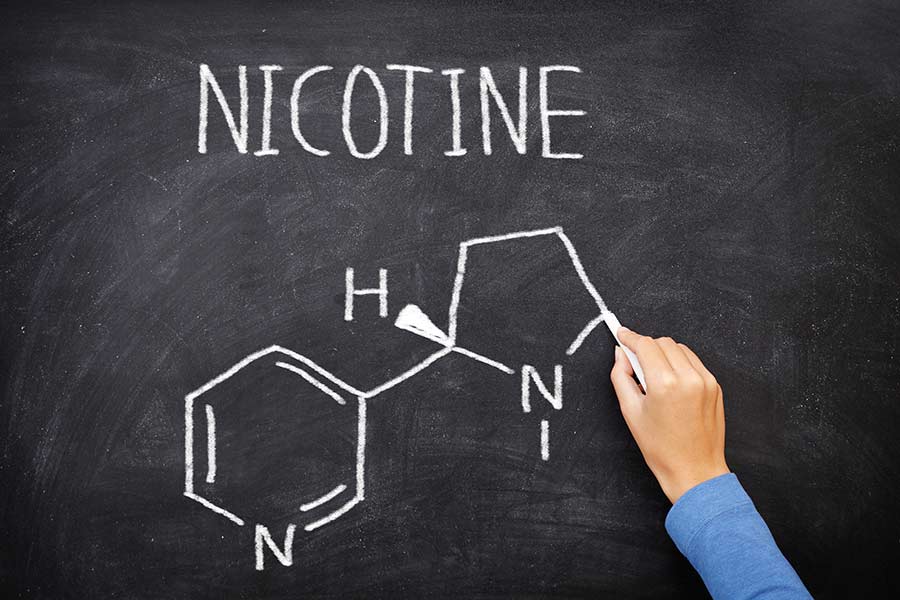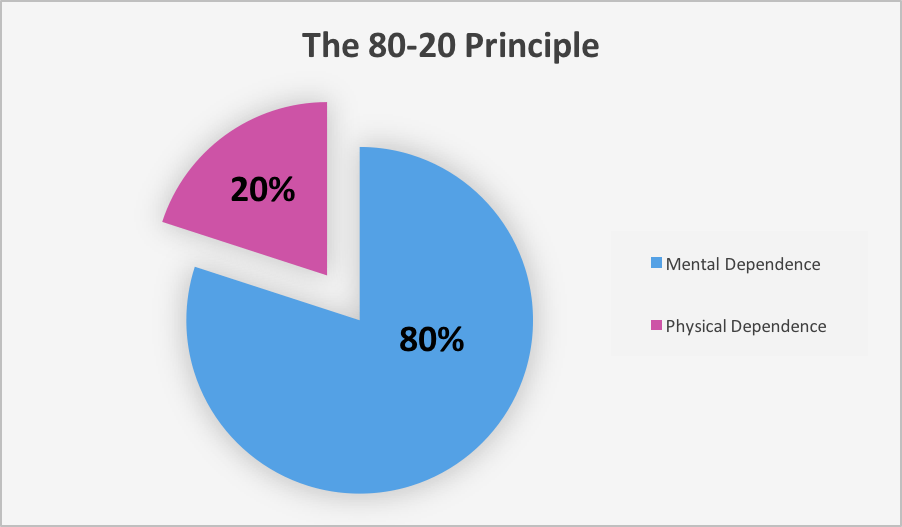Are you exploring different ways to quit smoking, because you want a method that will really work for you?
Have you tried to quit in the past but failed or relapsed after a while?
And do you want to stop smoking, but worry it’s too hard and stressful?
Well, since you are here, I believe that at least a part of you really wants to stop this habit.
That much I know.
Maybe you’re here because you want to break free from this addiction and live a long, happy life with your loved ones.
Perhaps, you are struggling with your breathing and worrying about how smoking might be affecting you.
Possibly, your energy does not sustain you throughout the day anymore.
Maybe you are just sick of the smell. And of having to draw money out of your pocket every day to pay the tobacco companies.
Or maybe, although you have everything in your life under control, cigarettes are the one thing controlling you.
And you hate that.
Right?
I bet you have a dozen reasons to quit. Especially, when knowing what happens when you quit smoking.
That’s why nearly 7 out of every 10 smokers want to quit for good.
But to be fair, everyone is looking for ways to quit smoking that are easy, permanent and stress-free.
After all, that’s the best way to quit smoking: a way that helps you quit easily and permanently, without any stress, weight gain or feelings of deprivation.
Don’t you agree?

They believe they’ve run out of options. Or they believe quitting cigarettes is meant to be hard, so they postpone it indefinitely.
Or even worse, some smokers use outdated ways to quit smoking that make quitting hard.
So they fail, then they blame themselves for it, and they end up believing they have an addictive personality or not enough willpower.
But it doesn’t have to be that way. Not anymore.
Nowadays, science has progressed. We understand how our brain and body get addicted to smoking. So we know exactly how to remove this addiction for good.
And after nearly a decade (can’t believe it’s been that long!) of research, my team and I have developed a cutting-edge quit smoking method that tackles this addiction for good: the CBQ method.
The Cognitive Behavioral Quitting method – CBQ – has 94% success rate. 85% of smokers quit permanently on their first attempt, and 9% quit on their second or third attempt.
What makes the CBQ method so successful?
The key here is that you first stop wanting to smoke, and THEN you break the habit of smoking.
Now instead of telling you why the CBQ method is the most effective way to quit smoking naturally, I’d rather show you.
Because no matter what I say, you are the one who will choose how to stop smoking.
So how can I show you?
By comparing all the common ways to quit smoking- nicotine replacement therapy, vaping, pills, cold turkey, with the CBQ method.
Just to be clear. Many smokers manage to quit with stop smoking aids.
- But do they find it easy?
- Do they stay smoke-free?
- Are they stressed and anxious?
- And are they gaining weight?
Let’s see.
The 5 Ways to Quit Smoking: Comparison
1. Nicotine Replacement Therapy (NRT)
In Nicotine Replacement Therapy you quit smoking by using products – patches, gums, lozenges – that contain nicotine.
Easy
At first sight, it seems that these products make quitting easier by minimizing your nicotine cravings.
But does staying addicted to nicotine make quitting easier?
And do you actually reduce your nicotine cravings?
Nicotine products do not alleviate the nicotine withdrawal. Instead, they prolong it. When you stop supplying your body with nicotine, the cravings eventually end. When you keep taking nicotine, the cravings continue for as long as you remain addicted.
Unless you plan on taking these products forever, you will eventually have to stop using them and go through the inevitable physical withdrawal.

Would you advise a heroin addict to stop using heroin by chewing it instead of injecting it?
Of course, not!
But why?
Because how can you overcome the addiction to a drug by taking the same drug you are addicted to?
It’s impossible.
As a matter of fact, it’s easier to relapse if you are already addicted to nicotine. As long as you have nicotine inside your body, you are always one step closer to smoking a cigarette.
This is backed up by the director of the Centre for Global Tobacco Control at Harvard School of Public Health whose research proved that nicotine gums and patches can keep you off of cigarettes only for a few months.
Stress
All of us have used cigarettes to smoke our stress away.
If nicotine had such a relaxing effect, then smokers would be the most relaxed and careless people in the world. And you and I both know that that’s just not true.
What’s true, is that nicotine is the very thing making us anxious. Every time our body is low on nicotine, we experience stress and even panic. This kind of stress is also called “craving.”
When we smoke, we feel relaxed, yes.
However, we don’t relax because the cigarette calmed us down. We feel better because we supplied our body with nicotine and ended the exasperating craving.
Plus, what calms us down when smoking is the familiar, repetitive movement we do with our hands.
In times of uncertainty, it’s the ritual, the habit of smoking that gives us a sense of stability and makes us feel okay. Not the nicotine.
In that sense, we can feel as relaxed by adopting any other ritual, from doing deep breathing to counting sheep.
Why keep the stressful nicotine in our mind and body?
Weight Gain
Substituting cigarettes with other forms of nicotine makes you feel you are making a sacrifice by quitting. This, in turn, makes you feel deprived. And when we feel we’re missing something, we try to find other ways to fill that void.
The easiest, fastest and most comforting way is food.
Right?
That’s why nicotine products are likely to cause you to put on weight.
2. Vaping
Vaping has a short overview. The reason is simple: Vaping is NOT a quit smoking method.
Vaping is a physical and mental addiction. You still make the same hand gesture; you stay addicted to nicotine, and to the idea that you need nicotine to feel relaxed and happy. You’re just using a fancier device.
And remember that at some point, you will have to quit vaping, which is the same as quitting smoking. Because you still have to experience nicotine withdrawal, stress, weight gain, and deal with having your hands empty.
Research that was presented at the American Thoracic Society Conference shows that people who managed to replace smoking with vaping did so for 3 – 6 months.
Yes, most smokers who vape STILL go back to smoking because they want the “real thing.”
But who can blame them? They never even had the chance to overcome this addiction.
In case you are planning to vape forever, you need to know that vaping cause pop-corn lung and damage our vision.
There is countless proof. Unfortunately, this truth is not in the best interest of tobacco companies. (Yes, most vaping devices are sold by tobacco companies).
3. Smoking Pills
Smoking pills cause chemical reactions in your brain that make you feel less enjoyment when you smoke. But for how long? And at what expense?
Easy
The chemicals pills have side effects like depression, hostility and suicidal thoughts, so they make your life nothing but easy.
In fact, they are dangerous. The Medicines and Healthcare products Regulatory Agency (MHRA), has received over 1,513 reports of adverse reactions, including 62 reports of suicidal feelings.
In the UK alone, Champix was the cause of 80 deaths from 2006 to 2011. Half of them were suicides. Some might think that 80 deaths are nothing compared to the thousands of smokers who use this pill, but I cannot accept this, and I believe you feel the same way. Every life matters.
Permanent
Taking smoking tablets decreases your cravings for nicotine…for as long as you take the tablets. Some people manage to stop smoking for a while. Others still smoke while taking this medication.
But here’s the thing. Medication does not remove the reasons why you smoke. Your desire for a cigarette is still there. Plus, you still don’t know how to keep your hands busy or deal with stress and boredom without cigarettes.
You tell me: How easy is it to relapse when a big problem comes up or after a heated argument?
Stress
Since this medication messes up the chemical balance in our body, it can cause an overall emotional imbalance and stress.
So not only we feel stressed because we can’t smoke, but we also have the additional emotional burden that comes with the pills.
Listen. Medication does not alleviate the stress. What really helps, is finding alternative ways to relax, feel happy and cope with life without smoking.
Weight Gain
Smoking pills will not cause weight gain or help you manage your weight.
4. Quitting with Willpower
Using your willpower to stop yourself from smoking is a natural smoking cessation way and the healthiest alternative so far. Let’s have a closer look.
Easy
Here’s what happens when we use our willpower to stop smoking cigarettes: we first stop smoking and then wait for our desire to smoke to fade away and disappear.
But does it disappear by itself?
Unfortunately, it doesn’t. Because time and willpower can’t remove our need to smoke.
What happens instead, is that we feel deprived and the thought of a cigarette becomes even more precious.
When a craving strikes, we can think of nothing else other than smoking. So we either suffer or give in and smoke.
That’s why the willpower way is unbearable for most people.
Permanent
The success rate of quitting abruptly with willpower is 4-7%.
This shouldn’t be surprising.
When you stop smoking while still ENJOYING it, then you feel you’ve lost a friend, a comfort.
And the more deprived we feel, the more we tend to rationalize our thoughts of having “just one cigarette” in times of stress or even in happy times.
We say to ourselves “one puff won’t hurt.”
But this puff becomes a cigarette. One cigarette becomes two, and soon after that, we’re back to our smoking habit.
Stress
When you deny yourself the cigarette you crave… you suffer mentally because you still desire a cigarette, but you can’t have it. That’s when you start getting anxious and overwhelmed.
If you’re like I was, then your anxiety might be increasing just at the thought of not being able to smoke when you are stressed, bored, or when you feel your hands empty. So you live in a constant state of irritation and agitation.
Let me tell you, this is not how smoke-free life is supposed to be like.
Weight Gain
Most smokers who quit and gain weight are the ones who use willpower to stop themselves from smoking.
Trying to resist a cigarette with willpower, can only make you turn to food so you can distract yourself from your craving. Also, cravings feel a lot like hunger, so you get tricked into eating without being hungry.
And the thing is that most of us go for fatty food when we feel down. Because fatty food is comfort food. If we eat chips or chocolates every time we have a craving, then gaining weight is inevitable.
5. The CBQ Method
The CBQ method is a natural smoking cessation method that removes your desire for smoking. You don’t take harmful chemicals, and you don’t stay addicted to nicotine.
So if the CBQ is a natural way to quit smoking, then what’s the difference with using your willpower to quit?
The difference is that with the CBQ method you first stop desiring a cigarette, and THEN you quit.
When you use your willpower, you do the exact opposite. You first stop smoking and THEN wait for your desire to smoke to disappear all by itself.
If you think about it, this is also how nicotine products and smoking pills work. You first try to stop yourself from smoking with these products and then you expect (and often pray) to wake up one day and not feel like smoking anymore.
The fact that the CBQ removes your need to smoke before you quit has some incredible benefits in store for you.
Easy
When you stop craving a smoke before you quit, you can’t possibly feel deprived without cigarettes. Plus, you don’t need to use willpower to resist smoking. Because there is nothing to resist.
Keep in mind that when you use a method that removes your cravings from the core, you don’t experience problems like concentration, headaches or fatigue because there are no cravings to cause them in the first place.
That way, you may not even notice the physical withdrawal from nicotine.
Permanent
The CBQ helps you become a happy non-smoker because it removes the reasons why you smoke. And when we are happy without cigarettes, and we have absolutely no reason to smoke, we don’t relapse.
Besides, the CBQ teaches you new ways to deal with stress, boredom, anger, depression and of course, how to enjoy social occasions, keep your hands busy and manage your weight without cigarettes.
Because if we can cope with the ups and downs of life better as nonsmokers, then we don’t need to ever take another puff.
Stress
When you stop enjoying smoking before you quit, you don’t experience stressful cravings, and you don’t overthink about the situations when you can’t smoke.
So you don’t feel anxious when you don’t have a cigarette. Because there is nothing to miss.
The best thing is that the CBQ method includes exercises and techniques that show you how to relax without cigarettes.
Weight Gain
When you stop desiring a cigarette, you don’t feel the need to replace it with food, because there is nothing to replace. This is enough to keep you from putting on weight.
Some people even lose weight because quitting increases their sense of well being so they make healthier food choices without putting any effort!
Can you see now why removing your desire for cigarettes is the best way to stop smoking?
In fact, removing your desire for smoking before you smoke your last cigarette… is the easiest and most reliable solution.
So now you know what are the 5 most popular ways to quit smoking and which works best.
That’s why, if you haven’t done so already, make sure you watch the free video where I show you how you can stop smoking with the CBQ method. To get the video click here (just add your email address so I can send you the link to your video.)
If you have watched that video, here’s what I want from you:
I’d like you to leave a comment below.
And please share the #1 reason why you smoke and the #1 reason why you want to stop.

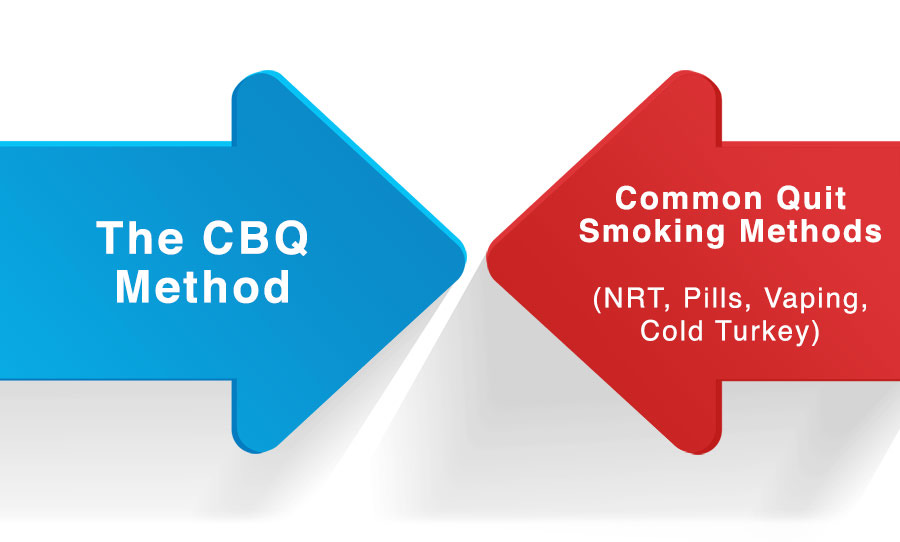

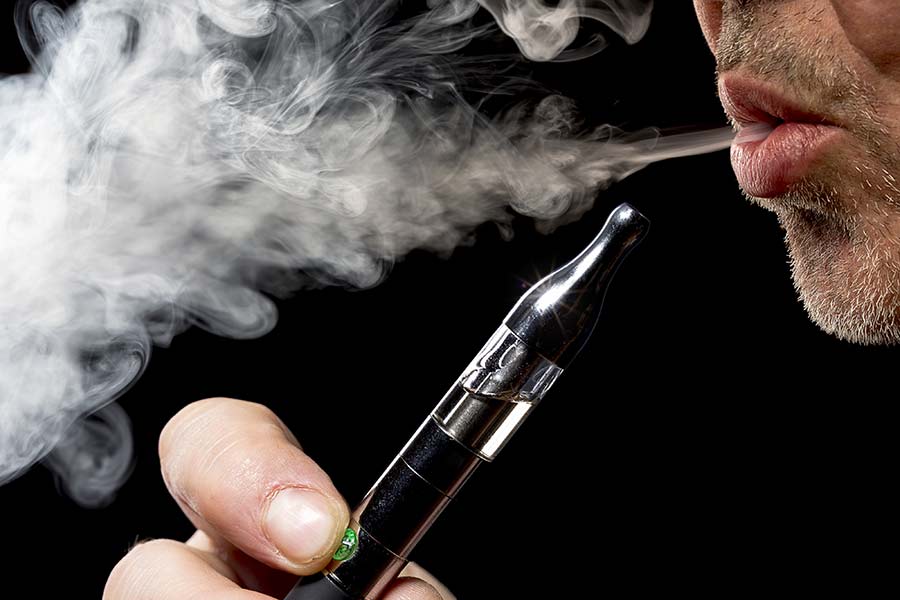







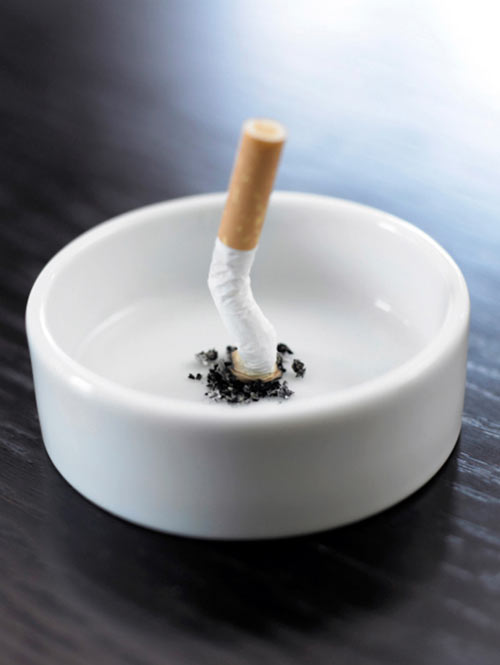 “When you said it was easy to quit, I have, to be honest; I doubted you. But it was just like you said. I smoked my last cigarette and immediately felt that I was done with smoking. Your method helped me get rid of this empty feeling I got when I had a craving.
“When you said it was easy to quit, I have, to be honest; I doubted you. But it was just like you said. I smoked my last cigarette and immediately felt that I was done with smoking. Your method helped me get rid of this empty feeling I got when I had a craving. My withdrawal was much easier than I expected. When I had a craving or I was stressed or needed some time alone, I was in my garden getting busy so that I wouldn’t smoke or eat. My husband didn’t recognize me.”
My withdrawal was much easier than I expected. When I had a craving or I was stressed or needed some time alone, I was in my garden getting busy so that I wouldn’t smoke or eat. My husband didn’t recognize me.”


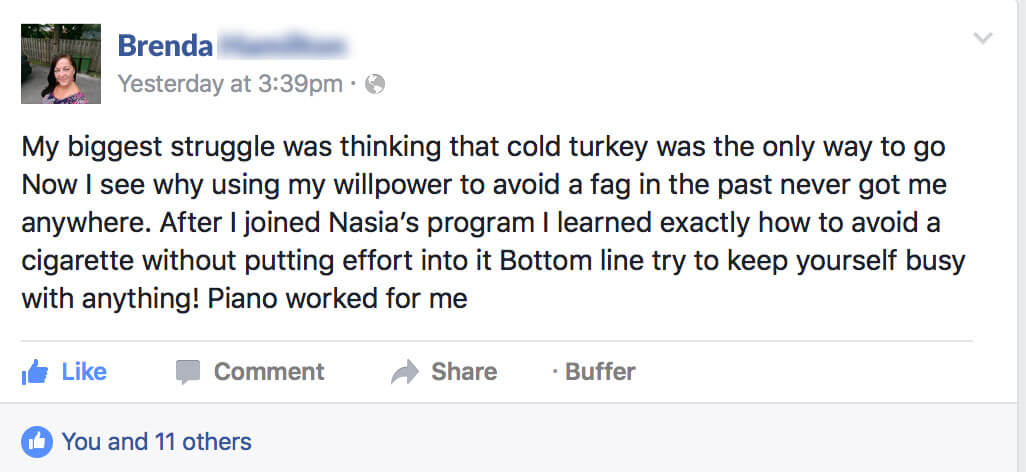 Moving on…
Moving on… But smoking is mostly a mental addiction.
But smoking is mostly a mental addiction.

 “How can YOU make an iron-clad decision to quit smoking?”
“How can YOU make an iron-clad decision to quit smoking?”
